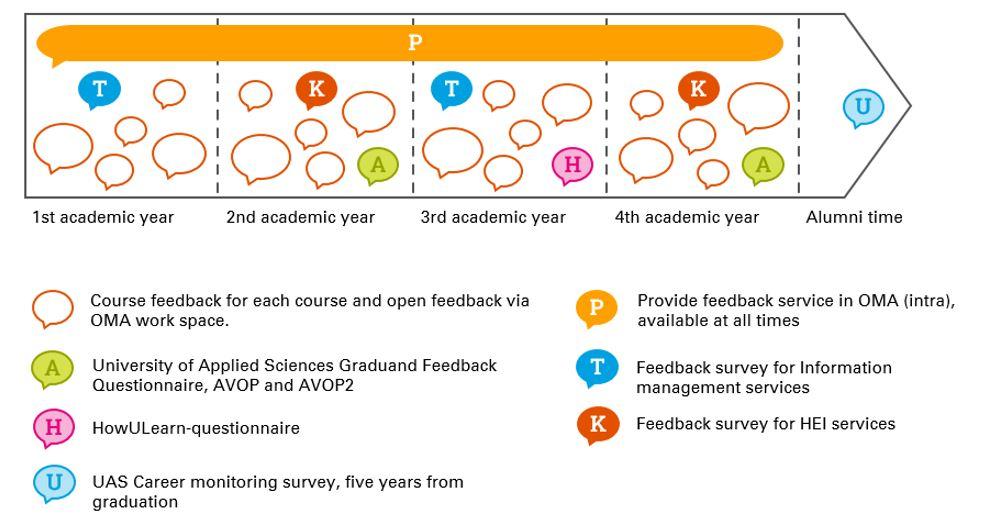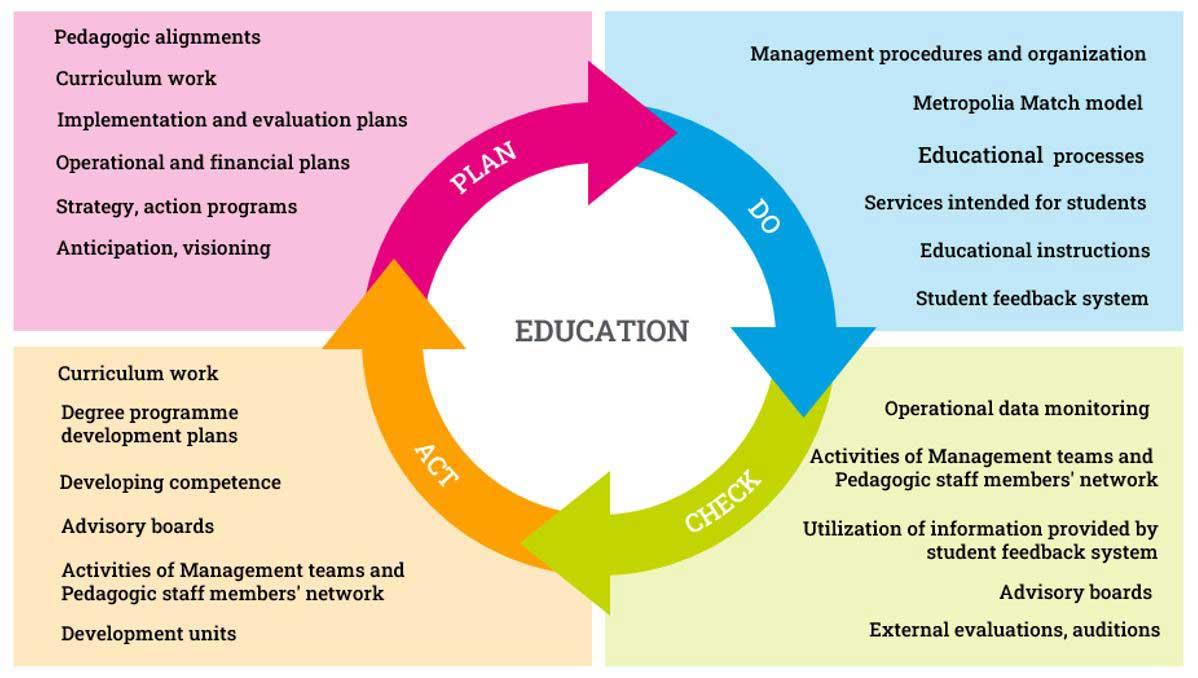Multiple avenues for student feedback
Metropolia collects student feedback via several channels. Degree students may use various feedback channels at different stages of their studies (figure 8) and after graduation. Students in other learning solutions provide feedback at the end of their studies. In addition to course feedback, students can submit open feedback through the workspace in the OMA intranet. Twice a year, non-degree students provide feedback on how the customer process functions and on how willing they are to recommend the studies.

Figure 8 Metropolia’s student feedback system
The response rate in the course feedback survey has been low, and the practices regarding reciprocal feedback are teacher- and degree-specific. The new course feedback will be implemented in the autumn of 2022. The process of reciprocal feedback is in place, but self-assessment has shown that it is necessary to reactivate it after the pandemic.
In 2019 and 2020, Metropolia tested the HowULearn questionnaire intended for all degree students. The questionnaire, based on theories of university-level learning and research on higher education, will be implemented in autumn 2022. Students answer this survey once during their studies. It provides information on students’ learning experiences. It also enables the students to receive personalized feedback and guidance that supports learning and studying. HowULearn includes a joint workshop for students and personnel.
Graduates provide feedback in the national UAS graduand feedback questionnaire (AVOP). To accelerate the development cycle of education, the AVOP questionnaire has been adjusted for students in their second academic year (AVOP2). The annual UAS Career Monitoring Survey gives information about alumni who graduated five years ago and are in working life. It describes the employment rate of the alumni, the career opportunities received through education and the alignment of the studies with the needs of professional life. It also offers the alumni an opportunity to influence the development of education.
Academic Services collect feedback from students and personnel on their services through questionnaires every two years. The feedback is processed in Academic Services’ team meetings. Increasing cooperation between the Academic Services and Education has been one area of development. Information Management Services collect feedback from students and personnel regarding their services every two years.
In self-assessment, feedback system and culture as a whole were identified as an enhancement area. Open feedback provided by students and the feedback received through student associations indicates a concern that the given feedback has no impact. In addition, compiling feedback data from different sources requires the mastery of several different tools and the process for using the information in the development varies in degree programmes. Based on the self-assessment, the development of the feedback system has been selected as a focal point for the work of Metropolia’s quality group (see 3.3) in autumn 2022.
Management systems and procedures support assessment and development
Education consists of ten schools and two development units that support the operations and are managed by the Director of Lifelong Learning. Operations are managed according to the PDCA cycle (figure 9).

Figure 9 The management of education is interlinked to quality management.
Learning Development unit develops and coordinates internal shared processes of Education, and Learning Networks and Services focuses on Education services provided externally, such as the career services for immigrants. In addition, education development is supported by the pedagogic staff members’ network for pedagogic development, consisting of school personnel, as well as the digital mentor network that supports the digitalization of education in particular (see 1.4). The systematic implementation of shared processes and operating policies throughout the area of lifelong learning has been identified as an area of enhancement.
Education processes the information provided by the feedback system. This concerns the management team of Lifelong Learning, the management teams of the schools and/or degree-specific teams. The processed information is then applied to the development of degrees and to pedagogic decision-making. Indicators describing credit accumulation, study progress and graduation in degree programmes and lifelong learning are used to monitor the study programmes. The data is accessible in the reporting portal. Development work to assemble the data into one platform (QlikSense) is in progress. Monitoring of the indicators is the responsibility of the heads of schools and heads of degree programmes. The information is reviewed by the management teams of the schools and during personnel development days. Each head of degree programme is in charge of assessing their respective degree programmes and identifying development needs.
The schools perform an annual pedagogic assessment and prepare a development plan, supported by the schools’ pedagogic staff members. The plan will be integrated in the degree-specific development plans in 2022. In addition, discussions on education development are conducted in the annual workshops for managers and heads of degree programmes. The workshops also include representatives of other units of the UAS, such as RDI, Academic Services and Business Activities. The development of the offering of non-degree-awarding education is coordinated in the Learning Networks and Services unit in cooperation with the schools. The monitoring and assessment of the offering by the open UAS is the duty of its steering group.
Students participate in the development of education by giving feedback and via their representatives in the METKA student union. The President meets them approximately once a month during semesters. The Director of Lifelong Learning meets METKA representatives and representatives of sector-specific student associations 3–4 times per year. METKA’s representatives participate regularly in the feedback discussions in meetings of the Lifelong Learning management team. In addition, METKA develops peer mentoring and student activist operations in cooperation with the Student Well-being Services.
Needs of the business world are incorporated in the development of education through the activities of advisory boards, networks, and project activities as well as other RDI activities. Sector-specific alumni networks are strong. Information about the needs of the business world is obtained in connection with multidisciplinary innovation project studies, work placement, theses, as well as project activities and other RDI activities. The opinion of the business world is also heard by means of the RDI integration in innovation hubs and collaboration platforms (see 4). In addition, there is a forecast project under way at Metropolia. It models the future needs of the business world. Utilizing the needs of the business world and forecast data in the development of education systematically has been identified as an enhancement area.
| Strengths | Enhancement areas |
| Recurring student feedback surveys (course feedback, AVOP, AVOP2, HowULearn, Career Monitoring Survey). | Systematic use of student feedback in the development of teaching, and the provision of reciprocal feedback. |
| Open and frequent dialogue with the METKA student union and sector-specific associations. | Systematic use of needs of the business world and forecasts as part of the development of education. |
| Services provided by Academic Services and Information Management Services are universally valued. | Adherence to common guidelines and agreed practices in all Lifelong Learning. |